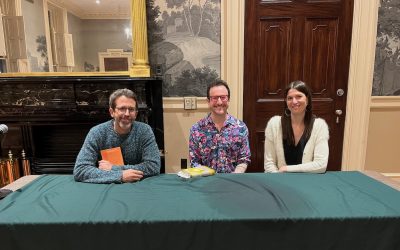New York Times best-selling author, poet speaks to Drew University students
April 2021 – The 2020-21 Writers@Drew series at Drew University went out with a bang—and a narwhal drawing contest—with New York Times best-selling author Aimee Nezhukumatathil.
Nezhukumatathil, whose book World of Wonders: In Praise of Fireflies, Whale Sharks, and Other Astonishments, a collection of essays about the natural world, won the Barnes & Noble 2020 Book of the Year and was a finalist for the Kirkus Prize in nonfiction, brought immediate enthusiasm and fun to the virtual event.
From the first minutes, she encouraged interaction from the audience, asking them to fill the Zoom chat with their locations, names of their favorite elementary school teachers, and outdoor happy places, before teasing out the drawing contest to help liven up the event and spark creativity.
Enlarge

Nezhukumatathil took students through her academic and writing careers and read a few poems and an essay before answering questions from the audience.
“I’m a poet at heart, which is like being famous in the deep, deep sea,” she joked when asked about the recognition she’s received from the success of her work.
“Being a famous poet is feeling like you’re famous to, like, mushrooms. You don’t go into writing poetry for fame and fortune.”
One student asked how Nezhukumatathil chose the plants and animals she wrote about in World of Wonders.
“When I was sitting down to write, I didn’t say, ‘I’ll write about motherhood and, hmm, koalas,'” she explained.
“I always started with a question and I would think about what animal would best connect with it. I wanted to showcase birds and plants and animals that some people would be familiar with, like a monarch butterfly, and then things like an axolotl and cassowary that people probably hadn’t heard of before. I wanted to show you can care for things, people, cultures, animals, and plants that are on the other side of the planet without ever having an experience with them.”
Another student asked whether or not writing could be taught.
“We forget one of our first words is look,” she began.
“‘Look, mommy! Look at the moon! Look at this flower! Look at my toe!’ We’re all in astonishment over so many things, small and big, but something happens to many of us in junior high or high school where someone says, ‘The moon is stupid,’ or, ‘Flowers are dumb.'”
“I would say, number one, absolutely writing can be taught. Number two, it’s not that hard as long as you tap into what humans have been doing since they were gathered around a fire, which is telling stories, making metaphors, making things come alive with words. Humans are meant for that. Any time someone tells you to not do that or that’s dumb or not cool, that’s the unnatural part. Writing is one of the things that humans are really good at, and I think with the right kind of encouragement, we can be our best selves: storytellers communicating with each other.”
Lastly, Nezhukumatathil was asked about the best piece of advice she got early in her career.
“Someone who was not a writer told me to make things,” she said.
“The word ‘poet’ is Greek for ‘to make.’ For some of you, that may be making things with words, it could be making a pot, it could be drawing with a stick in the mud. As long as you’re making and wanting to learn to make things, you’re in a good place.”
Writers@Drew events are co-sponsored by The Casement Fund and the English Department and are always free.


